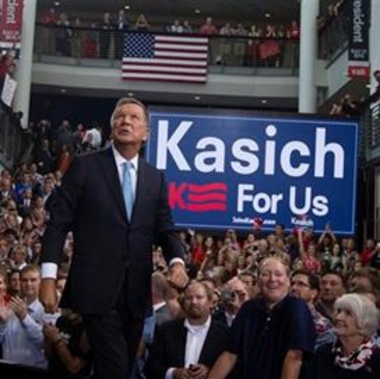Where they stand: John Kasich on issues of 2016 campaign

Columbus, Ohio (AP) — Where Ohio Gov. John Kasich stands on various issues that will be debated in the Republican presidential campaign, a race he joined Tuesday.
Immigration
Kasich says people who came to the U.S. illegally years ago and are otherwise law-abiding should be granted legal status if they pay a fine. People who entered the U.S. illegally more recently should be sent back. Overall, he says, "I'm not for putting them on a school bus, driving them to the border, opening the door and telling them to get out." As a congressman, Kasich voted to provide more visas to high-skill immigrants and to designate English the official language of the U.S.
___
Foreign policy
Kasich supports the deployment of U.S. ground troops as part of an international effort to defeat Islamic State group militants. He favors a significant expansion of the Navy and says, in retrospect, the invasion of Iraq was a mistake. As a member of the House Armed Services Committee in the 1990s, he voted to limit production of the B-2 bomber. Despite leaving Washington in 2001, he says he's maintained relationships with political figures abroad. "I'm not brushing up on anything," he adds. "I've been involved in this for a very long time."
___
Social issues
Kasich cites his Christian faith in public policy decisions such as championing Medicaid expansion under the federal health care law and increasing spending on government anti-poverty efforts, which are opposed by many fellow Republicans. Kasich has signed state laws restricting abortion rights in Ohio. He backed Ohio's ban on gay marriage. But after the Supreme Court invalidated such state bans, he urged public respect for the decision and attended a gay wedding the next weekend. Kasich is a death-penalty supporter who's seen 12 men executed under his watch. He also pushed back Ohio's execution schedule into 2016 after problems with lethal injection and commuted some sentences. On gun rights, he supported a ban on assault-type weapons when he was in Congress but signed an Ohio law reducing training, residency and license-renewal requirements for people permitted to carry concealed weapons.
___
Education
Kasich supports the Common Core academic standards that most Republican candidates disdain. He says they represent a higher bar than Ohio had before and will allow the state to remain competitive. Kasich stripped state guarantees from Ohio's school financing formula, cutting money to many districts.
___
Labor unions
Kasich signed a 2011 law severely restricting the collective bargaining rights of 350,000 police, firefighters, teachers and other unionized public employees, only to see it overwhelmingly overturned by voters in a labor-backed ballot campaign. The faceoff sparked labor-backed rallies, an Ohio Statehouse lockdown and hecklers' cries that interrupted his first State of the State speech. Kasich conceded defeat and has since avoided pushing similar limits. So far, he has held off conservatives' efforts to make Ohio a right-to-work state. His administration negotiated a contract earlier this year giving about 30,000 unionized state employees their first raises since 2008. Around the same time, Kasich issued orders rescinding bargaining rights for independent home health care and child-care workers under contract with the state.
___
Climate change
In Ohio, the governor initially embraced alternative-energy mandates that prompted wind, solar and other renewable energy companies to expand operations, but then backed a two-year delay in the rules in a compromise with GOP lawmakers who want them repealed. He's repeatedly tried to raise taxes on oil and gas drillers, without success.
He's called climate change a problem that should be addressed but told the Financial Times he's not clear on the causes of it and does not favor "dramatic economic change of policy" when the science, in his view, is not certain.
By Julie Carr Smyth, Associated Press. Copyright 2015 The Associated Press. All rights reserved. This material may not be published, broadcast, rewritten or redistributed.
The Gayly – July 21, 2015 @ 6:30pm.





